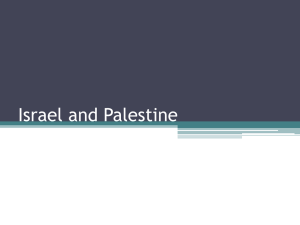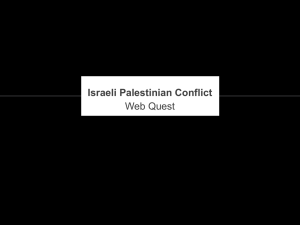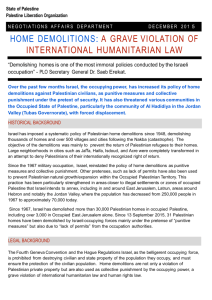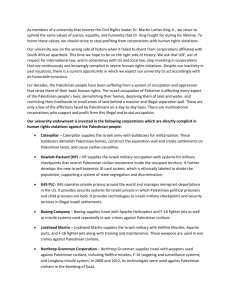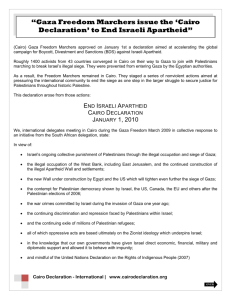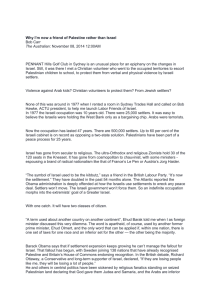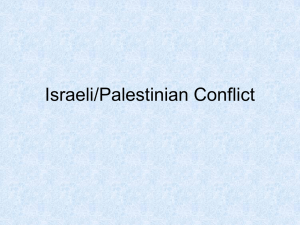PO Box 2030 Tel: +972-(0)54-303-9170 E
advertisement
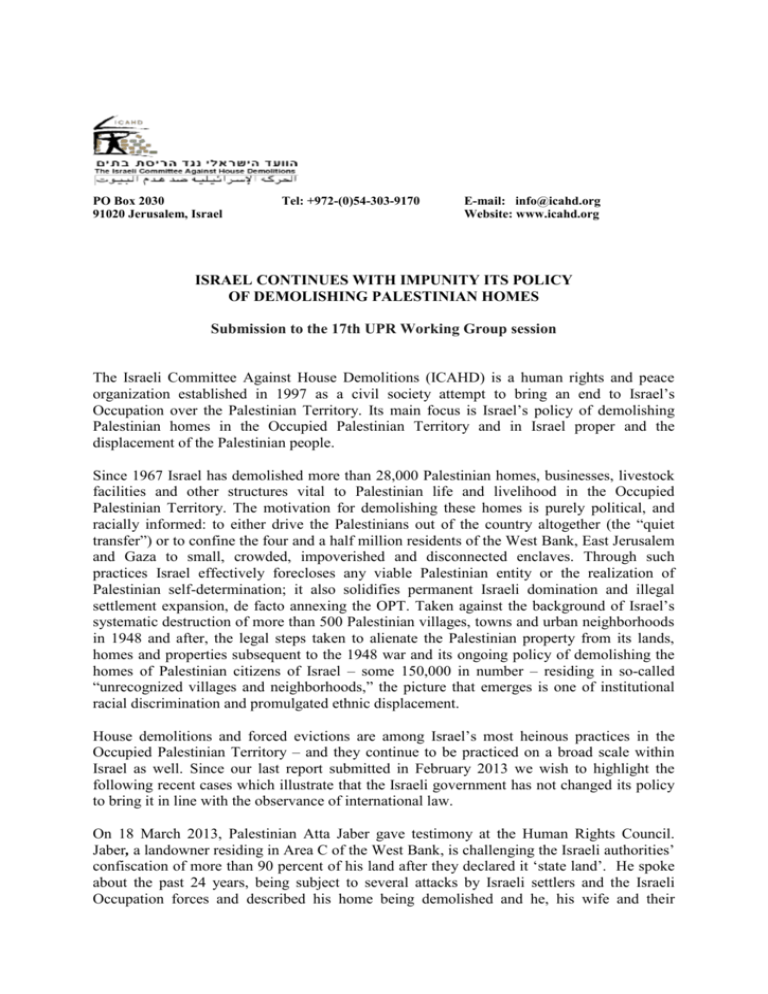
PO Box 2030 91020 Jerusalem, Israel Tel: +972-(0)54-303-9170 E-mail: info@icahd.org Website: www.icahd.org ISRAEL CONTINUES WITH IMPUNITY ITS POLICY OF DEMOLISHING PALESTINIAN HOMES Submission to the 17th UPR Working Group session The Israeli Committee Against House Demolitions (ICAHD) is a human rights and peace organization established in 1997 as a civil society attempt to bring an end to Israel’s Occupation over the Palestinian Territory. Its main focus is Israel’s policy of demolishing Palestinian homes in the Occupied Palestinian Territory and in Israel proper and the displacement of the Palestinian people. Since 1967 Israel has demolished more than 28,000 Palestinian homes, businesses, livestock facilities and other structures vital to Palestinian life and livelihood in the Occupied Palestinian Territory. The motivation for demolishing these homes is purely political, and racially informed: to either drive the Palestinians out of the country altogether (the “quiet transfer”) or to confine the four and a half million residents of the West Bank, East Jerusalem and Gaza to small, crowded, impoverished and disconnected enclaves. Through such practices Israel effectively forecloses any viable Palestinian entity or the realization of Palestinian self-determination; it also solidifies permanent Israeli domination and illegal settlement expansion, de facto annexing the OPT. Taken against the background of Israel’s systematic destruction of more than 500 Palestinian villages, towns and urban neighborhoods in 1948 and after, the legal steps taken to alienate the Palestinian property from its lands, homes and properties subsequent to the 1948 war and its ongoing policy of demolishing the homes of Palestinian citizens of Israel – some 150,000 in number – residing in so-called “unrecognized villages and neighborhoods,” the picture that emerges is one of institutional racial discrimination and promulgated ethnic displacement. House demolitions and forced evictions are among Israel’s most heinous practices in the Occupied Palestinian Territory – and they continue to be practiced on a broad scale within Israel as well. Since our last report submitted in February 2013 we wish to highlight the following recent cases which illustrate that the Israeli government has not changed its policy to bring it in line with the observance of international law. On 18 March 2013, Palestinian Atta Jaber gave testimony at the Human Rights Council. Jaber, a landowner residing in Area C of the West Bank, is challenging the Israeli authorities’ confiscation of more than 90 percent of his land after they declared it ‘state land’. He spoke about the past 24 years, being subject to several attacks by Israeli settlers and the Israeli Occupation forces and described his home being demolished and he, his wife and their children being left homeless. Despite the home being rebuilt attacks on them continue and they live in constant fear. This summer between 6 June and 12 July, on an almost weekly basis, either the Israeli Civil Administration or aggressive settlers from the Kiryat Arba settlement near Hebron invaded the Jabers’ property. The family was subject to threats and attacks and on Friday, 12th July, the settlers uprooted some of the family’s vegetables and replaced them with their own. Then, in September, 2013, in a case initiated back in September 2009 when the family objected before the Israeli Military Objections Committee in Ofer Military against additional loss of their land, an Israeli court ruled in favour of the Civil Administration. As a result, the Jaber family will lose another 11-12 dunams (three acres) to the expansion of the Kiryat Araba settlement whose very existence stands in stark violation of the Fourth Geneva Convention. As a direct result of that court ruling settlers from Kiryat Araba invaded the family’s fields and robbed five tonnes of grapes, depriving the family of vital income. In July 2012, Richard Falk, UN Special Rapporteur for Human Rights in the OPT, referred to Palestinian Shawamreh family, another family which ICAHD works with, in his report on Israeli violations. At that time the Shawamreh family, from Anata in Area C of the West Bank, had suffered five house demolitions because the Israeli authorities never granted them a building permit to construct a home on land that they own. In 2009, this case was presented before the Israeli Supreme Court as the Shawamreh’s sought to have the demolition order on their house repealed but they were unsuccessful. This was the test case on demolitions and revealed that even at the highest level Israel does not accept that it is an occupying power subject to observance of international law. At the time Falk was presenting his report, ICAHD along with international volunteers and Israelis and Palestinians who refuse to be enemies were rebuilding the Shawamreh home for the fifth time. However on 1 November 2012, Israeli authorities yet again demolished the Shawamreh home on grounds that it did not have a building permit. Not only are individual Palestinian homes demolished but Israel also targets entire communities. An example is that on 16 September 2013, 58 structures were demolished, including all residential structures and livestock shelters, in the herding community of Makhul in the northern Jordan Valley. All 10 families (48 people, including 16 children) were rendered homeless. No alternative housing options were offered. We are witnessing a process of ethnic displacement, what the Israeli government itself describes as “Judaization.” These institutionalized policies are intended to alter the ethnic, religious and racial composition of an affected population – Palestinians residing in Area C of the Occupied West Bank and East Jerusalem. As the Occupying Power, Israel is obligated to safeguard the homes of the protected persons (Palestinians) under international humanitarian law (namely the Hague Regulations and the Fourth Geneva Convention). Israel is bound by the Fourth Geneva Convention relative to the Protection of Civilian Persons in Time of War, to which Israel is a signatory. Article 53 prohibits destruction of property that is not justified by military necessity. The Fourth Geneva Convention also prohibits the transfer of an occupying power’s civilian population into the territory it is occupying and the transfer of an occupied civilian population out of its territory. Article 49 stipulates: “Individual or mass forcible transfers, as well as deportations of protected persons from occupied territory to the territory of the Occupying Power or to that of any other country, occupied or not, are prohibited, regardless of their motive.” Israel’s claim that the Fourth Geneva Convention does not apply to the Occupied Palestinian Territory has been rejected by the international community, including the UN Security Council and the International Court of Justice (ICJ). Further, the Hague Convention of 1907 calls on state parties to respect, protect, and fulfil family honour and rights, the lives of persons, and private property, as well as religious convictions and practices. Recommendations ICAHD calls on the state of Israel to dismantle its system of institutionalized discrimination over the Palestinian people, to repeal all discriminatory laws, and to cease forthwith acts of persecution against Palestinians in the Occupied Palestinian Territory and in Israel; ICAHD calls on the Council in its concluding observations to forcefully insist on the application of IHL in the OPT, to act vigorously to protect the Palestinian people and its fundamental human rights and, particularly, to call for an end to that most painful policy of occupation – forced eviction and displacement as the result of the demolition of Palestinian homes, property, schools, businesses and infrastructure, which causes displacement and dispossession.. ICAHD calls for the transfer of powers and responsibilities related to planning and zoning in the West Bank, including Area C, to Palestinian jurisdiction in accordance with international law and bi-lateral agreements, to allow for a planning system to include community participation in all levels of the planning process. ICAHD calls for all refugees and internally displaced persons who have been forcibly displaced to be allowed to repatriate, return to their homes in safety and dignity, and be given compensation for any harm they have suffered, including the destruction of land, homes and property. ICAHD calls all states, intergovernmental organizations and civil society to cooperate to bring to an end the illegal situation arising from Israel’s practices of apartheid and persecution. In light of the obligation not to render aid or assistance, all states and IGOs must consider appropriate measures to exert sufficient pressure on Israel, including the imposition of sanctions. Conflict management and a preoccupation with humanitarian assistance to the Palestinians must give way to effective conflict resolution. ICAHD calls on the United Nations’ Human Rights Council to adopt the abovementioned recommendations ICAHD calls on the Council to reiterate its position and that of other UN and international agencies that the demolition of Palestinian homes, the expropriation of Palestinian land and the forced displacement that results, in particular in Area C of the West Bank, and East Jerusalem, are not only illegal under international law but are an obstacle to the enjoyment of human rights by the whole Palestinian population. ICAHD calls for an end to the Occupation of the Palestinian Territory and a prompt realization of Palestinians right to national self-determination.


